The Fatty Arbuckle Caper
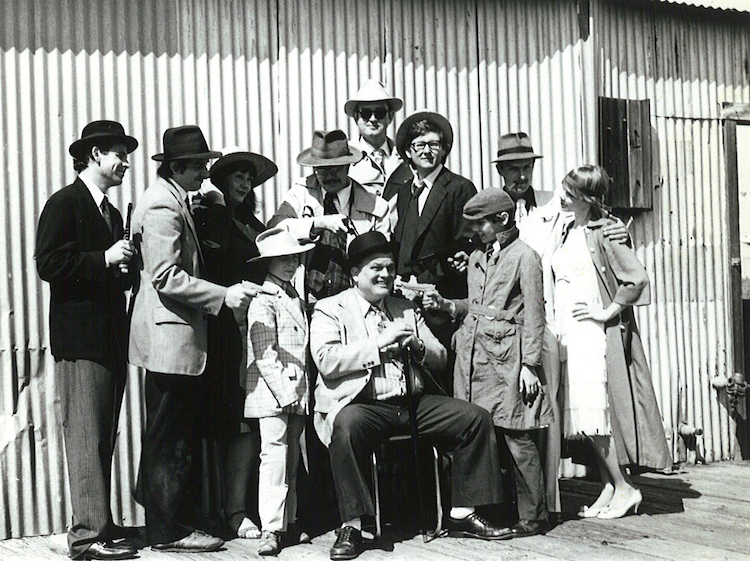
This blog post was originally published September 18, 2018 on John Law's personal blog.

These photos were a re-creation of the final shoot out on an abandoned ship to shore fueling platform on a dead end street on Islais Creek just south of the intersection of Marin and Illinois Sts.
The Suicide Club (1977-1982) would host pretty much any idea that anyone might come up with as an event. "Event" was a catch all descriptor that could be vague. Some years ago when Don Herron and I were writing a book (not yet published) on the adventures of The Suicide Club, I broke the events down into categories. Here's roughly what I came up with:
1) Urban Chase & Hiding Games. Variations on Hide & Seek, Foxes & Hounds, Killer, Capture the Flag, etc. Usually played on the streets, cemeteries or in huge abandoned buildings.
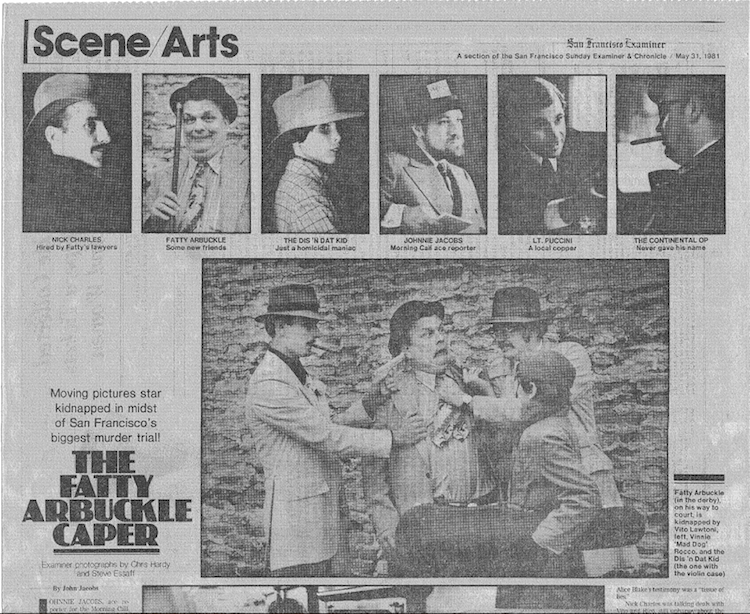
2) Costumed Role Playing Games. In specific interior locations or on the streets.
3) Street Theater. Different from #2 because the Costumed Role Playing games were entirely for the benefit of participants. Public interaction was unneeded and sometimes unsolicited for Suicide Club street theater events, though when people on the street did notice, things could get funny in unexpected ways.
4) Urban Exploration. Exploring abandoned and sometimes occupied buildings, bridges, tunnels, and the occasional lone abandoned structure in more rural and natural environments.
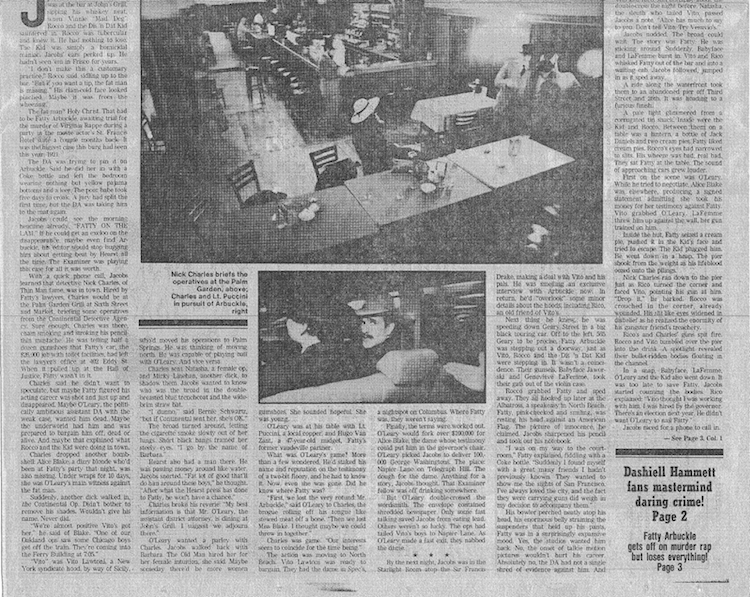
5) Group Psychological games. Usually played in a soft, safe environment like someones home (often in Gary Warne's comfy Circus of the Soul Bookstore on Judah St at 10th Ave. in SF) and drawn from popular psychology of the period and experimental theories on human communications. My favorite was Gary Warne's "Lock Yourself In A Room and See If You Agree". Five to ten people would agree to stay together in a comfortable place with tea & snacks. The group would pick the most extreme issue they could think of - one that they all did not agree on: gun control, abortion, euthanasia, capital punishment, etc. Players agreed to respectfully listen to and REALLY TRY to understand the, in some cases, disagreeable beliefs held by their fellows. The scrum would discuss the topic until everyone understood the reasons behind the strong views of others. The goal was not to agree on the issues, rather to understand the reasoning and belief systems of others. It wasn't that radical an idea at the time - understanding others. What was uncommon was to make it a game.
6) Infiltrations. Members of the Club would "join" or at least visit with and observe extreme or fascinating groups. Religious cults, political extremist organizations, protest groups and the like.
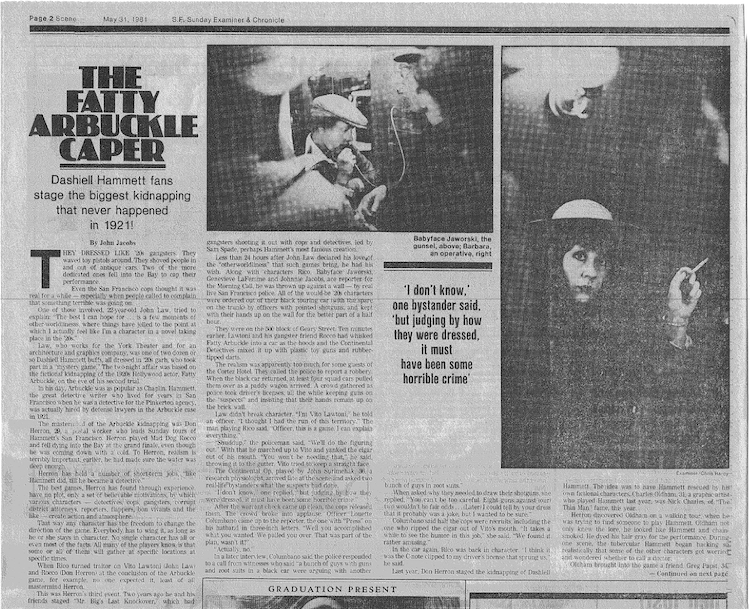
7) Suicide Club "away trips" to visit weird tourist attractions or to attend curious events or performances, occasionally to join in in some odd fashion as in attending The Calaveras County Frog Jumping Contest in 1977 where the Suicide Club entered a human in a formal dress (Gary Warne), white gloves, top hat, etc., carried out to the jumping line by a giant frog (Jayson Wechter in a frog costume).
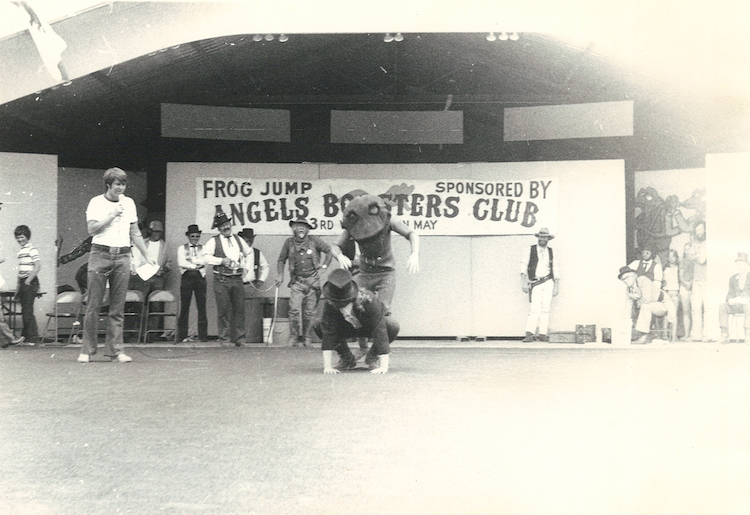
Suicide Club enters giant frog in Calaveras County frog contest 1st popularized by Mark Twain
Various Suicide Club games, events and protocols can be studied HERE and HERE.
Don Herron was a member and event organizer in the Suicide Club from the very first. He was influenced and informed by fiction, and he used his knowledge of and love for fiction in building some of the most involved and amazing Suicide Club events.
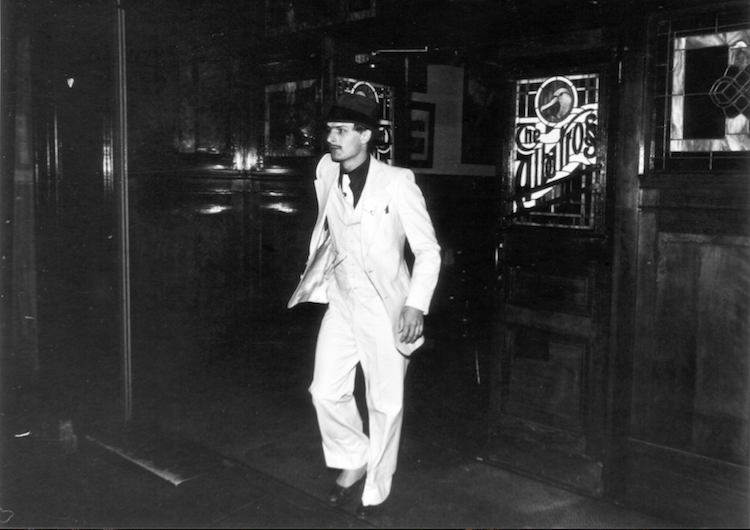
JL coming out of The Albatross Saloon (later San Francisco Brewing Company. Even later The Comstock) on Columbus Street. Hot in pursuit of Maude Delmont.
Don's primary literary influence was Dashiell Hammett the American hardboiled detective fiction writer that virtually founded the genre. Don, like many in the Club, was encouraged to create events based upon his interests. Concurrent with the founding of the Club. He started a walking tour based upon visiting and recounting tales of the locations in San Francisco that Hammett lived and worked in as well as the actual and imaginary locations Hammett described in his novels and short stories set in SF. He presented his first tours as "classes" in the SF free school Communiversity, which was also the cradle of the Suicide Club.
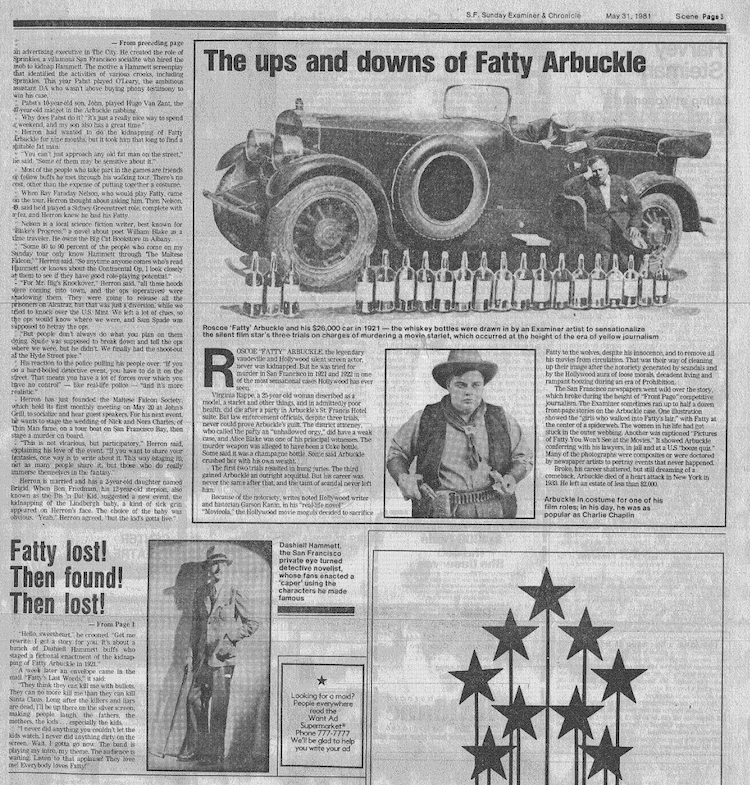
In the earliest iterations of The Dashiell Hammett Walking Tour, although Don was not a professional presenter or speaker though he was very knowledgable about his subject. His amateur delivery was honed by several tours every week, and he quickly turned his walk into a professional, entertaining and very hardboiled tour. Now in its 41st year, the Hammett Tour has been covered by most media outlets you could name, and is the longest running literary walking tour in the United States. While Don was building his tour, he also created and led Suicide Club events based upon his obsessions.
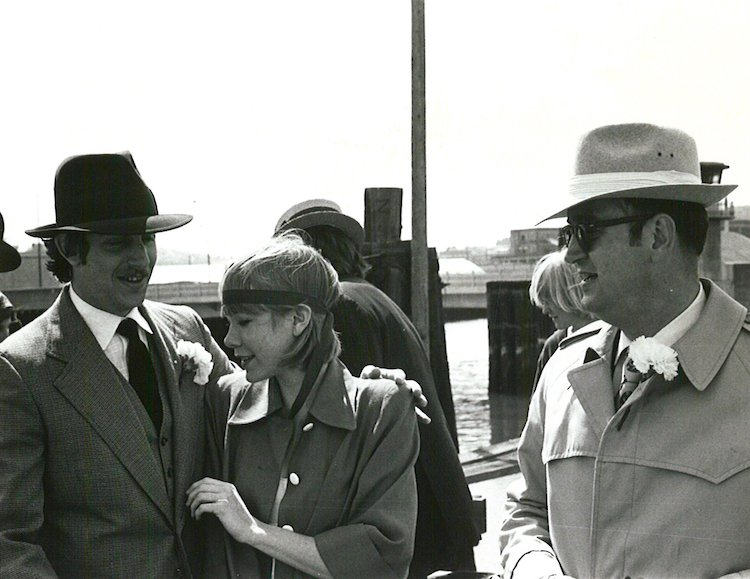
Barry Wolf from Continental, Maude Delmont & The Op
Among other events, Don created three based on the mythology and trappings of modern hardboiled fiction; these games were particularly influenced by the writings, aesthetic and real tough guy substance of Dashiell Hammett (he told HUAC to stuff it and went to prison) and his characters, Sam Spade and the Continental Op were the very embodiment of the phrase "hardboiled". Don not only affected a Hammett-esque hardboiled persona, he embodied it. Like many well known writers, Don needed a "real" job to make ends meet and drove taxi for Luxor Cab for decades. Among his many adventures as a cabbie, he chased a fare that bolted without paying into Golden Gate Park and tackled the guy, holding him until he paid up!
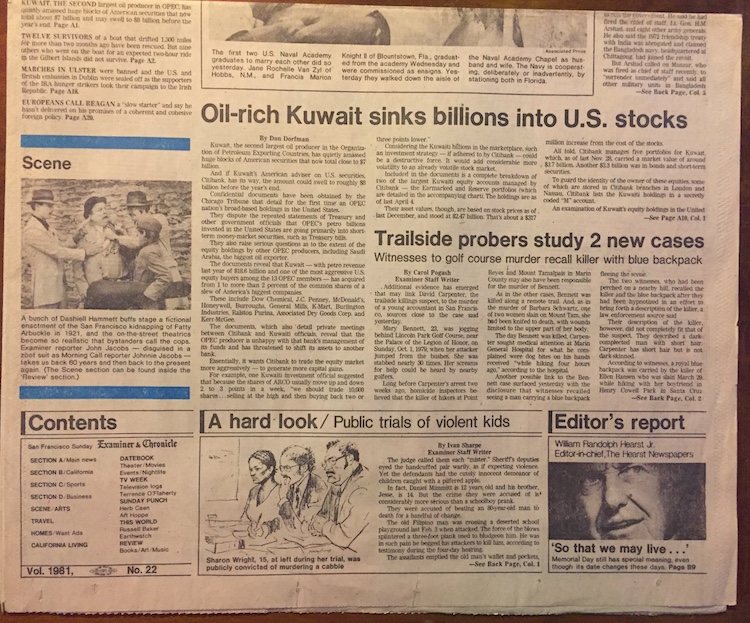
Encouraged by the spirit and collaboration of the Suicide Club though he undoubtedly was, Don groused a bit about the "lack of character development and authenticity of period dialogue and mannerisms" in many of the clubs participants in his first two detective games.
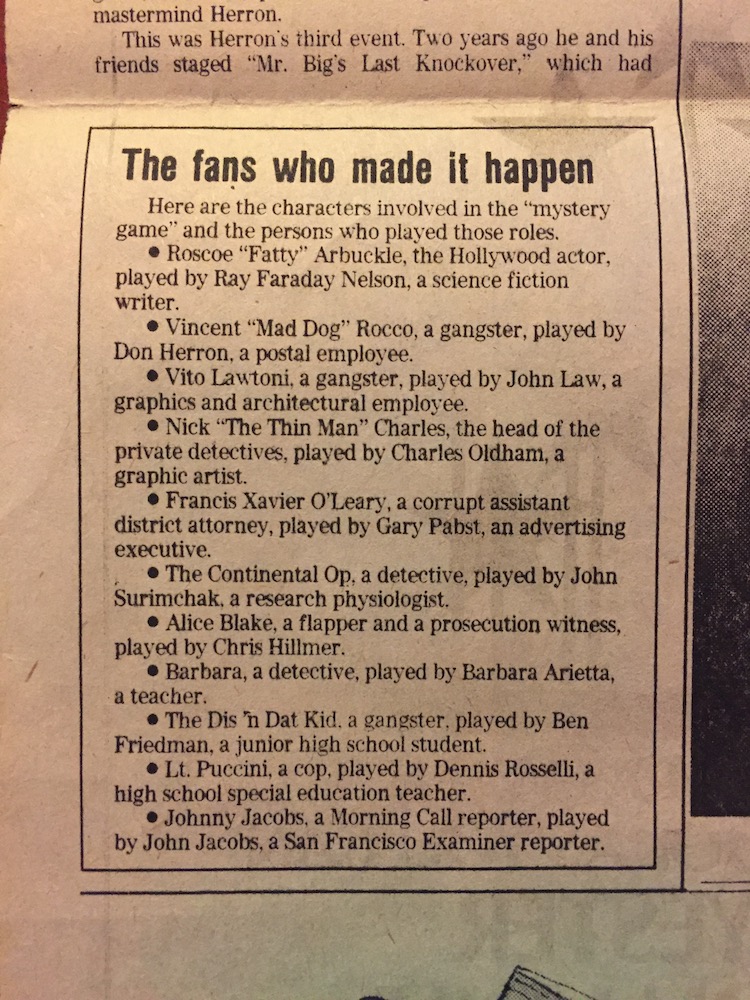
In his desire to infuse the game with as much genuine 20's Hammett Frisco essence for the third and final game, Don cast his net further than the Suicide Club for many of the primary characters. On his walking tour, which met every Sunday at Noon, perhaps half of the audience knew nothing of detectives and were attending merely because it was on the tourist information boards, Maybe another 30-40% had some small interest in the field. There were always that 10%: the died-in-the-wool hardboiled aficionados. It was from this group that Don recruited his perfect Nick Charles: graphics artist and club bouncer Charlie Oldham, a man so glib and with such a witty and sardonic delivery that many of his off the cuff comments, observations and insults could have been written by Hammett. Oldham had played the character of Dashiell Hammett in an earlier game.

L to R: Dis n Dat Kid, Vito, Francis Xavier O'Leary, Rocco & Fatty
A hard drinking US military research scientist, John Surinchak impressed Don with his uncanny resemblance to Hammett's second most famous creation, the Continental Op: a nameless dick from Continental Detective Agency that appears in two novels and many short stories. The Op was balding, paunchy, not too tall, sharp as a damascus blade and tough enough to take repeated beatings from bruisers and psychos and bounce back with a street level bon mot and a beefy right to the jaw. It turned out that Surinchak was a tough guy in real life too. The event was designed with three tiers of involvement for potential players and a rough outline created by Don that contained several facts relevant to the theme yet required no specific scripted outcomes. The third and outer tier, "The Hats" were players that showed up the day of the event in costume, but had not taken the time to create complex characters. They had some autonomy in the game, and if they were clever enough, could in theory take initiative and alter the course of the game; for the most part, they would follow the second & first tier players about and do what ever they said. Hence the appellation "The Hats" dropped by Charlie Oldham's Nick Charles character when noticing that wherever he went, he was followed by a "Sea of Hats!"
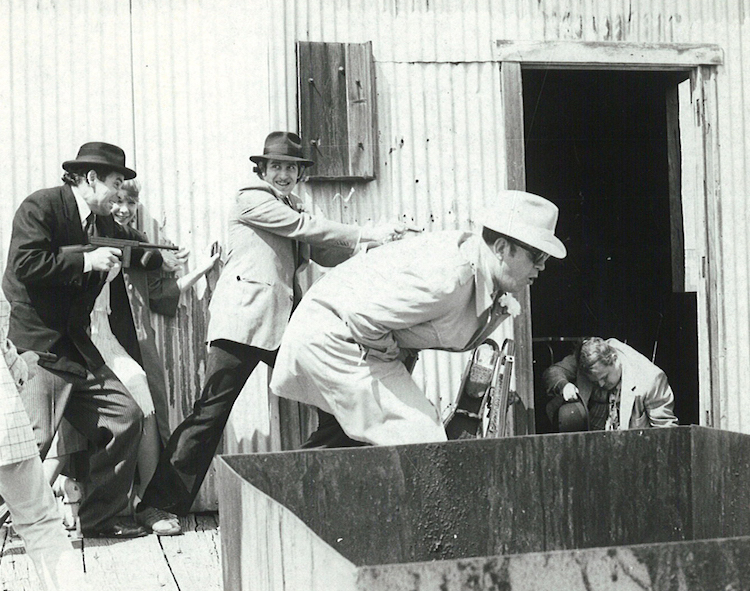
L to R: Lt. Pucinni, Maude Delmont, Barry Wolfe, The Continental Op (taking it in the gut) and Fatty
The first tier consisted of major characters with established backstories and some existing history which might reasonably lead to conflict between some and the need for cooperation between others. These players were maybe a bit obsessive, typically well versed in detective and mystery fiction, protocols and plot mechanisms. Don gave each of these players a little "special information" prior to the game that would serve them in negotiating, threatening and/or partnering with others. The second tier consisted of those engaged enough to pick a character from fiction or simply make one up and have the wherewithal, without the months preparation, character development and deeper immersion of the tier 1 players, to involve themselves in and even change the course of the games direction. Anything could happen and it depended upon the cunning and ambition of the players.
Although there was no stated goal that all parties were necessarily moving toward, the central figure and "McGuffin" of the piece was Hollywood comedic superstar actor Fatty Arbuckle. Fatty was being prosecuted for the accused sexual assault with a coke bottle of an unknown LA actress, Virginia Rappe who consequently died from injuries claimed to have taken place at a wild party hosted by Fatty taking place in several rented suites atop the St. Francis Hotel.
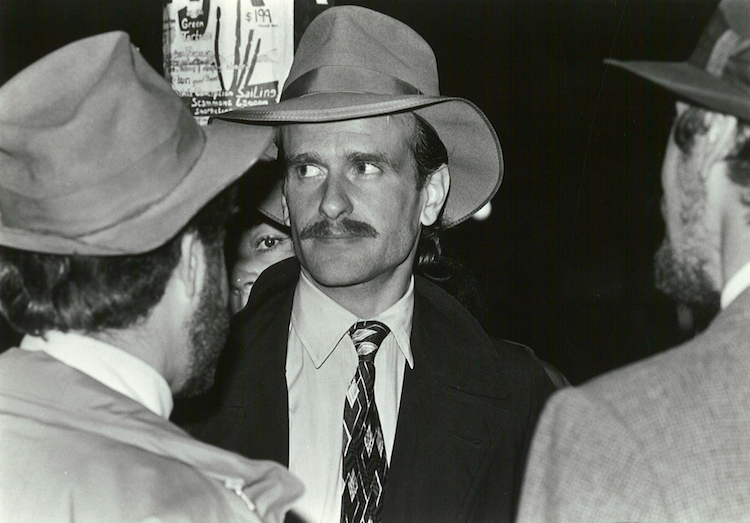
Charlie Oldham played Nick Charles, leader of the detective contingent trying to rescue Fatty Arbuckle from the clutches of Vito Lawton, Rocco and the other gangsters.
Don was having a hell of a time finding the right "Fatty". He had to be excellent in order to anchor the game. He had to be big, jovial, quick witted, dexterous and agile in that big man sort of way. Don wasn't finding anyone capable of the role and was getting frustrated. Finally, not long before the game, Ray Nelson came on the Hammett Tour. Over drinks after the walk, Don realized he had his perfect Fatty. Nelson was a veteran SciFi novelist and owned Big Cat Bookstore in Albany CA. He had been close to Phillip K. Dick when they were both starving writers in Berkeley in the early 60's. Ray is cited by PKD experts as the inspiration for the character of Roy Batty in Dick's novel Do Androids Dream of Electric Sheep: "Phil thought I was a machine like fellow, with little emotional expression. I was a MENSA member and I think he was a little put off by that." {paraphrasing Ray from a long ago memory} Ray also holds the distinction of writing the story that John Carpenters awesome movie They Live! was based on. Ray ended up being the perfect Fatty, glib, spry, resilient, and a bit paradoxical: did he do it? or was he an innocent, like his movie characters? Don recruited me as lead gangster Vito Lawtoni & Jayson Wechter as "Rico" to work with Don's "Rocco" as the NYC gang that kidnaps Virginia Rappe and Fatty to use as coin for buying their way into the SF underground after being run out of Palm Springs and LA by established mobsters. Lead characters backstories got fairly complex and we were encouraged to drop hints about them to other players. The three lead gangsters were all longtime Suicide Club organizers and were expected to be able to hold our roles and parlay effectively with the newer folks dropping clues for them to move ahead when they ran into a dead end in pursuing the action.
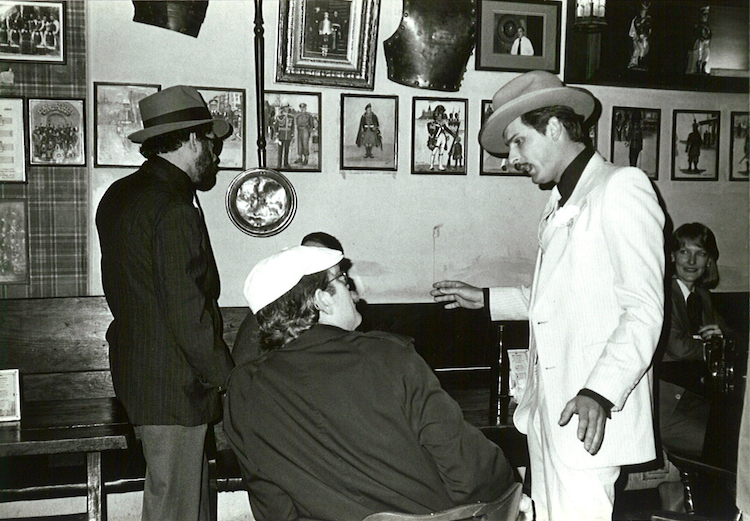
L to R: Rico. Joey Falconer, Vito in Tosca.
A good example was early in the game when the Nick Charles, the detectives and "Hats", over a dozen strong were stuck at the holy trinity of North Beach bars, Specs', Vesuvios's and Tosca Cafe not knowing where to go. We gangsters had just hijacked Fatty from his old vaudeville buddy, Fritz Leiber's at his apartment in the Tenderloin. After waiting awhile, we sent one of the players back to North Beach to insure that the good guys "heard the rumor" that Vito and gang were would be leaving a Tenderloin dive apartment building with Fatty in tow. Maude Belmont, best friend of the dead Virginia Rappe's (read the attached article pdf's for more story details) was caught in this action too. She was played by another excellent find from the Hammett Tour a young lady named Chris (can't recall her last name - Chris - are you out there?). She really had the femme fatale thing down and used her powers to snooker several of the male players out of information as the game wore on. Mayhem, cracking wise, rousting yeggs, (orange PlayCo dart) gunplay, cigar smoking and 20's style atmosphere ensued. As with all Suicide Club events, this one was not created for or intended to attract media attention. One of the generally accepted tenets of the Club was complete immersion in the event, making it a total life experience as opposed to being an exercise in self-consciousness.
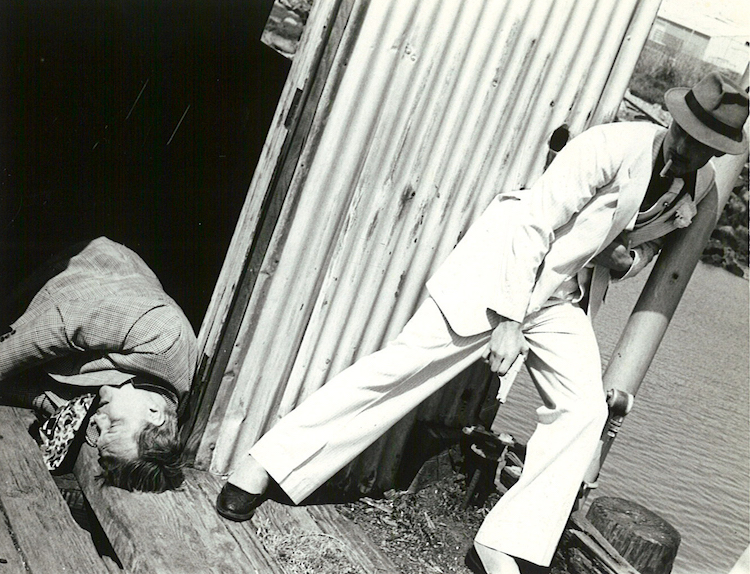
Why then, did this event warrant three full pages in the City's main newspaper? {Newspaper: a large format, multiple page paper instrument completely covered in thousands of words and some badly reproduced images that presented very compressed and seemingly random articles on local, national and international news that could be purchased in "newsstands" or metal boxes on the street that one would place coins into, or could be delivered to one's home by a child - yes things used to be that weird}. Don was becoming famous for his Hammett Walking Tour by this time.
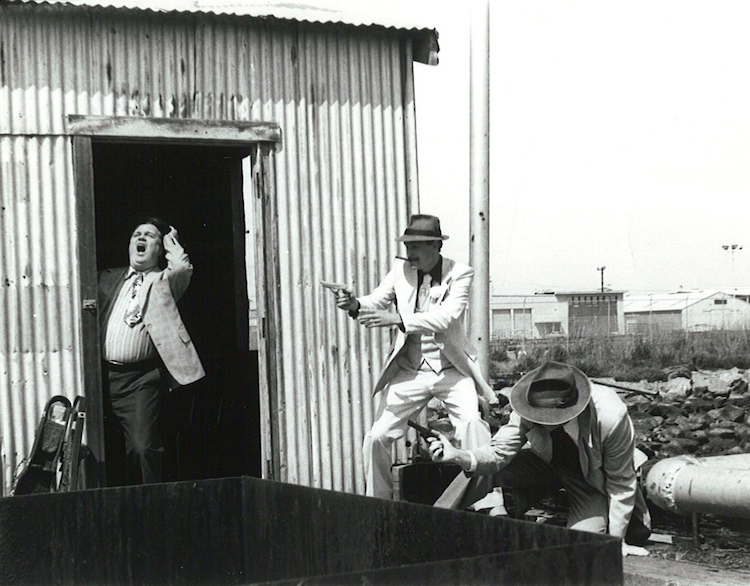
L to R: Fatty, Vito & Rocco
After starting as a Communiversity class (a default Suicide Club event) it quickly became a stand alone project that required Don's continual efforts, meeting weekly at that time. It had also already been repeatedly covered by local and national press. The SF Examiner (Hearst flagship paper) had recently done a feature on Don & the Hammett Tour. When the reporter filed the piece, he dropped the info about an upcoming "detective/gangster street game that Herron was planning. The paper's entertainment editor was very intrigued and called Don to see if the paper could "cover" the event. Don was not very encouraging. He told the hapless editor that he could not have a reporter and photographer intrusively following the characters and impeding the flow and serendipity of the game. The editor was insistent. After thinking about it a bit, Don told him it might be alright, but ONLY if the Examiner writer played a serious character in the game. The editor balked - "We're a newspaper, We cover stuff. We can't be the subject of our pieces."

Randy Shilts pumping Continental's man Barry Wolf for clues in Chinatown
And Don thought, that was that. Evidently not, since the editor couldn't put it down. He remembered that a new reporter working in the Health section of the paper was a great detective fiction fan. This is how we acquired one of the best players in the game. John Jacobs reputedly canceled a skiing weekend with his wife (much to her dismay) in order to cover Fatty Arbuckles adventures in Frisco. One of the great things about Don's plotting was the mix of real life history with detective fiction fantasy and individual players off the cuff creations and plot twists. Once Jacobs realized the scope of the game and the potential to immerse himself in it, he kind of went native, becoming the most obsessive and effective player in a scrum of obsessive and effective players. The actual Arbuckle case included three mistrials for the rape (reputedly with a coke bottle) and consequent death of aspiring Hollywood actress Virginia Rappe at a wild three day debauch amidst the penthouse suites atop the St Francis Hotel on Union Square. Information unearthed during the various prosecutions implied the possibility of alternate narratives,including the story that Rappes death by internal bleeding (assumedly from the leering fat man crushing her by his ponderous mass during a drunken assignation in he is private suite) was actually caused by a botched abortion that had recently taken place.

O'Leary, Dis n Dat Kid, Pucinni, The Op & Barry Wolf
As near as I can tell, the jury is still out today on how this young woman came to her untimely death. However, in the mid-20's this lurid tale was just what the blue noses, wanna be moral inquisitors and Hollywood censors represented by the Hays Commission needed to rein in what they saw as the rapidly growing degeneracy of the new Hollywood aristocracy. The attendant media frenzy swirling around the trials was the biggest story of the decade and the yellow journalism pioneer Hearst papers led the charge of moral outrage, selling a s*** ton of papers in the process. In his zeal to play an effective character and to tell great story, Jacobs dove into the Examiners archives digging up the most incredible and lurid accounts created by his predecessors by 50 years at the Hearst papers.
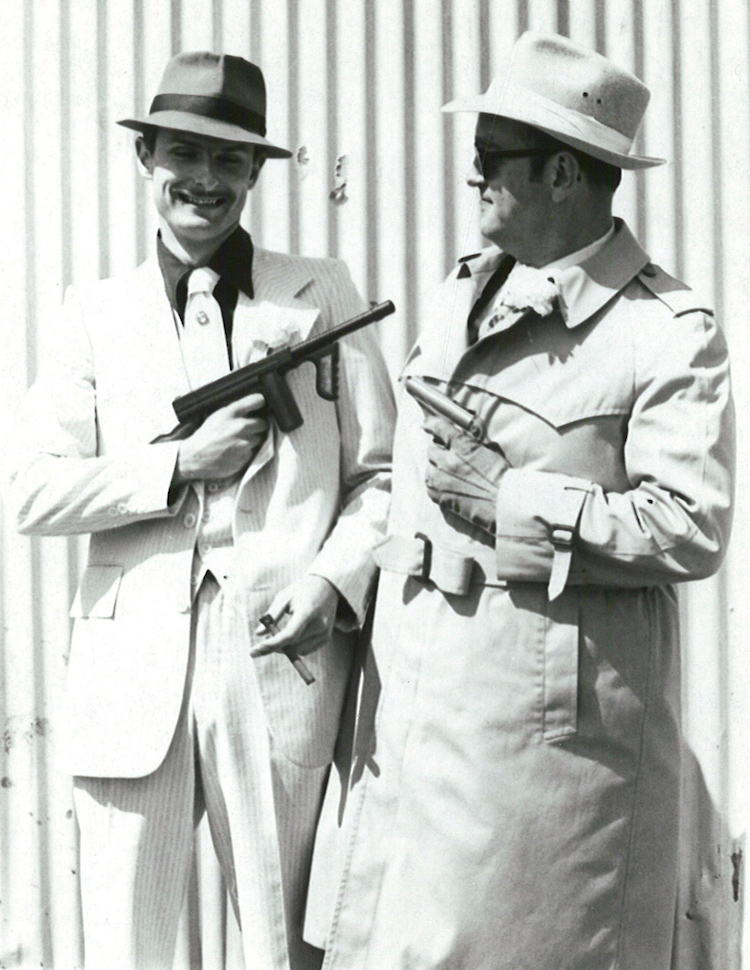
Vito Lawton & The Continental Op
John Jacobs created his character of "ace reporter Johnny Jacobs of The Daily Call (The Examiners main competition in the news game in SF in the 20's!) and proceeded to write his piece as though it were for his employers rival! This was all very "meta" before the term was ever in use. One of the old pieces from the Ex's graveyard files was of Fatty sitting in the middle of a spiderweb with strands leading out to the various ingenues present at (or even remotely connected to) the now mythical party/debauch. His editor scratched that one, probably figuring they were already risking their jobs due to the lurid and professionally damning accounts they were already presenting regarding their employer The Hearst Corporation. To top things off there was another journalist who had petitioned Don to cover the game. After agreeing to the same requirements his rival at "The Daily Call" had, SF journalist Randy Shilts donned a hat with a press card sticking out of the hat band and chased gansters and detectives around Frisco's mean streets for the next two days as well.
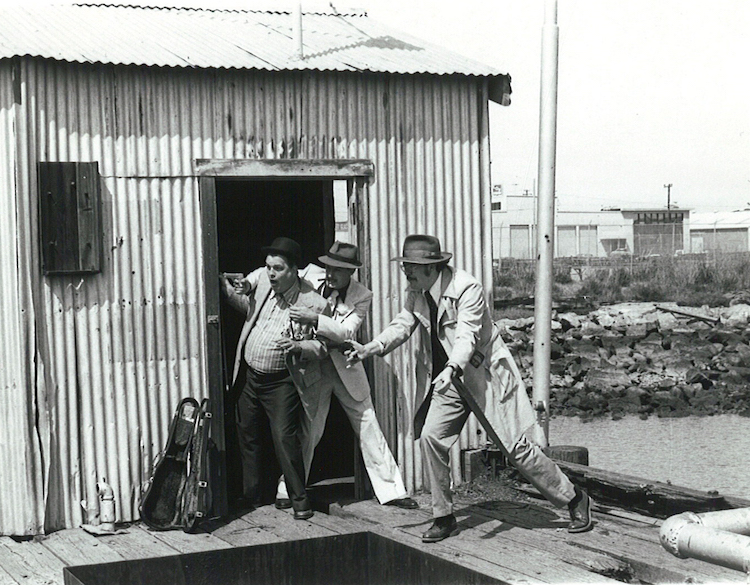
Fatty, Vito & Rocco
As a free lancer he never sold his piece to our knowledge, but his (forgotten - please contact if you know who he is) photographer took the awesome recreation shots that accompany my post. Randy Shilts went on to well deserved fame as a journalist and author of several books including the seminal early history of the AIDS epidemic "And The Band Played On". Both of these wonderful journalists died at young ages, Shilts of AIDS in 1994 and Jacobs of melanoma in 2000. It was a neat trick of Don's to require, convince and inspire these two sharp and talented writers to play such wonderful characters and to add so much to our collaborative narrative and the magic conjured.
The Fatty Arbuckle Caper remains one of my favorite experiences and was influential in my creative life by showing me just how profoundly the collective mind can shape events and experience.
Related Laughing Squid Posts- Carrie Galbraith (1956-2018), Creator of the Cacophony Society 'Zone Trip'
- A Set of Giant Wind-Up Teeth Painted on the Abandoned Dolphinarium Discotheque in Tel Aviv
- Realm of LARP, An Unscripted Reality Series About LARPing
The post The Fatty Arbuckle Caper appeared first on Laughing Squid.